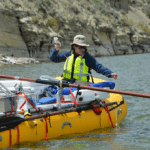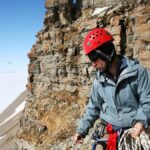When a scientific idea matures into a new medical treatment or green technology, a research scientist has worked to bring that idea to reality. Commercial research and development (R&D) teams work behind the scenes developing new products and services. For researchers itching to combine science and creativity, a career in commercial research and development is an excellent option.
Alt-Ac Careers: Commercial R&D
Timo van der Zwan is a Research Scientist, Microbiology & Process Development with Symvivo, a medical biotechnology company developing gene therapy solutions using commensal bacteria (bacteria that live on and in humans). The role of the Microbiology team is to develop and improve the company’s technology, utilizing tools and techniques from areas such as genetic engineering and protein biochemistry.
Straight after finishing his PhD at the University of British Columbia, van der Zwan was hired by Acadian Plant Health (in Nova Scotia) to set up the company’s new molecular biology laboratory, as well as to lead research and development of new products. His PhD focused on utilizing microbial enzymes to produce value-added products from forestry residues, and the molecular biology experience and knowledge of plant biomass he gained during grad school ended up being a great match for this challenge. After four years at Acadian, he moved back to BC for his current job at Symvivo.
Leon Chew is a Senior Scientist in the Research and Development Department at STEMCELL Technologies, a company that develops specialized materials and equipment for use in life sciences research. He specializes in developing cell culture media (essentially the food in which to grow cells in a lab) and accessory products to allow robust differentiation of stem cells into neural organoids – 3D models of human brain tissue in a dish.
Chew graduated with both a BSc (Hons) and MSc in biochemistry from the University of British Columbia. Having done co-op positions in both industry and academia, he knew he was interested in research-based work, which is why he went on to pursue a graduate degree. However, he knew that becoming a professor was not for him, so once he finished his MSc he began looking for jobs. After applying at over 40 companies, he finally got two job offers, one of which led him to where he is today.
Laura Iwan is a Systems Engineer for Unilia, a Canadian-Chinese company that designs and manufactures custom-made hydrogen fuel cell stacks for zero-emission bus and truck manufacturers. Here, she helps clients determine their technical requirements, translate these requirements into design specifications, develop fuel cell operating strategies, and troubleshoot operational issues.
Iwan became interested in clean-energy vehicles during her undergraduate engineering program at Dartmouth College, where she joined the solar car team and, later, converted a pick-up truck from gas to electric. Next, she did a Masters degree at Princeton, working on a hydrogen fuel cell project with General Motors (GM). After graduation in 1997, she decided to apply to Ballard Power, a leader in fuel-cell technology, and experience the adventure of a cross-continental move to Vancouver. Later, she worked for Automotive Fuel Cell Cooperation, a research partnership among several major car manufacturers.
In 2017, following a restructuring that resulted in several layoffs, one of Iwan’s former colleagues found out about an opportunity to design custom fuel cells for bus manufacturers in China. From there, the company that is now Unilia was formed, and Iwan was its second employee.
Keep reading for advice on a career in commercial R&D
Are you curious about how to secure an R&D job at a private company? Our professionals offered several suggestions:
- Explore. Co-op placements, internships, and academia-industry research partnerships (such as those funded through Mitacs in Canada) are a great way to learn about different industry sectors, job types, and company cultures. Find out what mix of these is the best fit for your own work style.
- Network. Chew points out that many jobs are “hidden” – advertised internally, or not at all. By reaching out to people at different companies, one gains access to this hidden world of opportunity. Iwan’s new opportunity at Unilia is a great example.
- Focus on your transferrable skills. Van der Zwan highlights that scientific training provides such transferable skills as effective communication, project management, critical thinking and problem solving. To apply only to niche jobs specific to one’s graduate research is to sell one’s self short.
- Keep striving. Finding work in a competitive industry can be daunting, as Chew’s initial job-hunting experience illustrates. It’s okay to take a position that’s slightly different from one’s “dream job” – for example, Iwan’s first job at Ballard Power was with the division that manufactured power plants, rather than cars. At each job, one develops skills that can lead to new opportunities in the future.
- Check in with yourself. Do you like what you’re doing now? Iwan stresses that a career doesn’t have to be entirely planned in advance – it’s always possible to change.
Join an established company, or start your own?
When her company restructured, Laura Iwan and her colleagues used the resulting layoff as an opportunity to build a new firm from the ground up. While recent graduates often prefer the safety of working for an established company, many also have entrepreneurial aspirations. Our next article in the Alt-Ac Career series will share the stories of four scientists with experience in business start-ups.
About Alice Palmer
Alice Palmer, MBA, PhD is a forest industry researcher and consultant based in Richmond, British Columbia. She writes about science, forestry, corporate strategy, politics, and whatever else piques her clients’ curiosity. Follow Alice’s blog Sustainable Forests, Resilient Industry here.
Alice would like to thank Timo van der Zwaan, Leon Chew, and Laura Iwan for their wisdom and insight into careers in commercial R&D, as well as Canadian Science Publishing blog editor Kristin McEvoy for her editorial contribution.
Banner image: HRAUN/iStock




